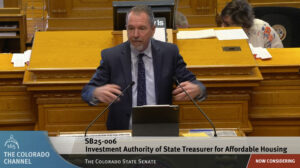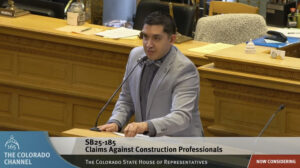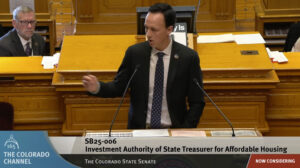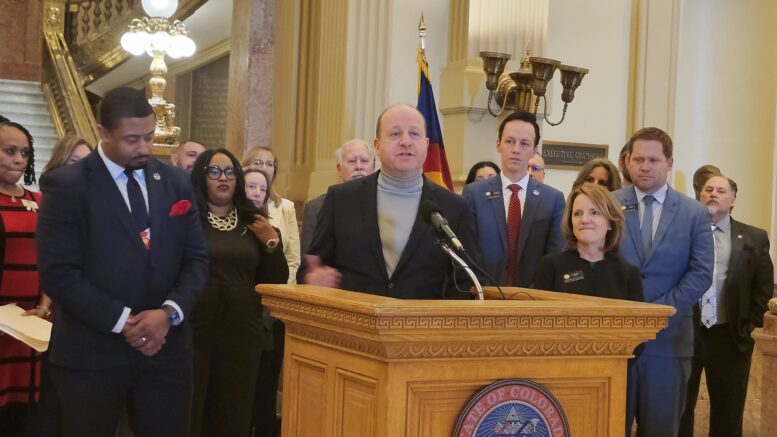If the 2024 session will be remembered as the one in which the Colorado Legislature pushed cities to allow for denser housing construction, the 2025 session may be known as the one in which legislators gave builders the tools to create new housing stock — possibly.
Gov. Jared Polis on Monday signed into law House Bill 1272, the first major construction-defects reform passed by the Legislature in eight years. Backers made it clear that the goal of the law is to boost the supply of attainably priced condominiums, a once-common entry point into home ownership that have slipped to 3% of new housing stock because of builders’ and insurers’ fears of lawsuits.
The enactment of the bipartisan bill, which offers legal protections in exchange for more guarantees of quality work from builders, came after the Legislature in its final week nixed a Republican effort to do even more to limit what defects can lead to lawsuits. It also came after Polis inked a law to streamline modular-housing permitting and legislators OK’d a yet-to-be-signed bill that will allow the Colorado Treasurer to invest $50 million in construction of affordable owner-occupied housing through below-market-rate bonds.
HB 1272 allows condo builders to enroll in a voluntary program that limits their exposure to lawsuits if they offer warranties of at least six years and hire a third-party inspector to monitor the construction process periodically. The Multifamily Construction Incentive Programs launches on Jan. 1 and will “spur new housing options that Coloradans can afford and offer more Coloradans a fair shot at the American Dream,” cosponsoring Rep. Shannon Bird, D-Westminster, proclaimed.

Colorado state Rep. Shannon Bird cheers at the start of a news conference in February rolling out her construction-defects reform bill.
Will construction-defects reform lead to construction?
In addition to making HB 1272 law, the Democratic governor penned a signing statement in which he directed the state demographer and the Department of Local Affairs to track how many builders participate in the new program and how many units are constructed. And while Polis was optimistic in the statement in saying the bill “will unlock opportunities for more housing now,” the tracking mandate seemed to acknowledge concerns from the construction community that HB 1272 may not go far enough.
As Colorado Association of Home Builders CEO Ted Leighty explained to The Sum & Substance last month, the bill could be both too obtuse and too prescriptive in different sections to convince homebuilders to participate in the program. And if developers don’t participate, it’s extremely unlikely that they will begin putting up affordable condos.
Homeowners can still sue under HB 1272 for damage that substantially affects the functionality of a system, causes loss of the use of real or personal property, results in bodily injury or wrongful death, causes unreasonable reduction in the ability of a building component to perform its function or causes an unreasonable risk of bodily injury. And it still permits attorney’s fees to be awarded in these cases — provisions that builders feel are too broad to convince insurers to bring down premium costs for condo construction that have worked in tandem with lawsuits to force many builders out of that market.
GOP alternative sought “major difference”

Colorado Senate Minority Leader Paul Lundeen speaks on a construction bill earlier this session.
Senate Bill 131, which didn’t get its first committee hearing until after HB 1272 had passed both chambers, had tighter definitions around the conditions for which such suits would be allowable, and sponsoring Senate Minority Leader Paul Lundeen said that was key. The Monument Republican said that while HB 1272 had “minor differences” with current law, his bill was a “major difference” (and dealt with rolling back green building codes and some tenant protections in rental properties).
“Effectively defining what is and what isn’t a defect should be the foundation of all reforms,” Leighty told the Senate State, Veterans and Military Affairs Committee before members killed the bill on a Democrat-led party-line vote. “Claims should be reserved for actual damages and life and safety issues.”
The third-party inspection program that HB 1272 establishes also may be so prescriptive that builders may have to use multiple inspectors to cover its requirements and end up spending so much that it offsets much of the reductions in insurance costs, Leighty said. He added in an interview last month that he hopes he is wrong about the limited impact the bill could have but is deeply concerned that it won’t move the condo construction needle.
Construction-defects reform backers offer caution
The bill still got widespread support from both parties, with the House repassing it, following a slew of Senate amendments meant to give more comfort to builders, by a margin of 61-3, with only three Democrats opposed. But a speech from Rep. Ryan Gonzalez, R-Greeley, showed the caution that even supporters were offering toward it.

Colorado state Rep. Ryan Gonzalez speaks in the House on a bill on construction lawsuits earlier this session.
“While no policy is perfect, this is a policy that will put us in the right place,” Gonzalez said. “This is an important first step to solving a very complex and very troublesome issue that we find in the state … It is not the answer to the affordable-housing crisis. But it is a step in the right direction.”
Median housing costs now reach $550,000 in Colorado, and the median age of first-time homebuyers in the state rose last year from 35 to 38. And with an estimated shortage of more than 100,000 homes, legislators didn’t seek to confine themselves to just one policy to boost affordable construction this session.
Other housing efforts
SB 2 — which Polis signed Thursday, the day after the 120-day session ended, directs the State Housing Board to develop regional building codes for factory-built structures and present them to the Legislature next session for statewide implementation. Supporters argue that such certainty in what local governments will permit will boost the supply of housing that can be made more quickly at lower prices, while Republican opponents said the bill would usurp local authority.
SB 6, which still awaits Polis’ signature, lets the treasurer’s office put $50 million to bonds issued by quasigovernmental agencies for the construction of homes that must remain permanently affordable to borrowers earning no more than 140% of area median income. Again, Republicans questioned whether this was the proper role of state government, but there was no debate on whether the bill would get more housing built.

Sponsoring Sen. Dylan Roberts speaks about his Senate Bill 6 earlier this session.
Last year’s efforts focused more on getting apartments and other forms of multifamily rental housing constructed adjacent to transit lines. Some critics said the state was missing an opportunity to create generational wealth by not doing anything to ensure that condos could make a comeback under such a scenario.
What may come next on construction
This year the effort clearly was on boosting owner-occupied affordable housing, and Monday’s signing ceremony was a celebration of the belief that HB 1272, in conjunction with other efforts, will do just that.
“This law is a proactive solution that incentivizes responsible development, making it a win-win for homeowners and builders alike,” said Senate President James Coleman, one of the bill’s Senate sponsors. “It is intended to meet the demands of our communities, respond to changing demographics and provide housing that is adaptable to different housing sizes and needs.”
Polis’ signing mandate to “collect, analyze and make public the impact of these reforms in the future” may be one of the biggest parts of the law moving forward, however. For if the warnings that the bill doesn’t do enough to inspire builders to start putting up condos again hold true, then that requirement could be the spur to restart the legislative discussion in a couple of years and take even greater action.
